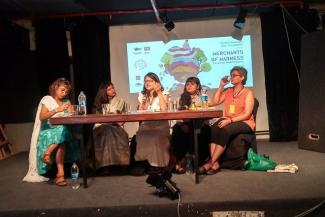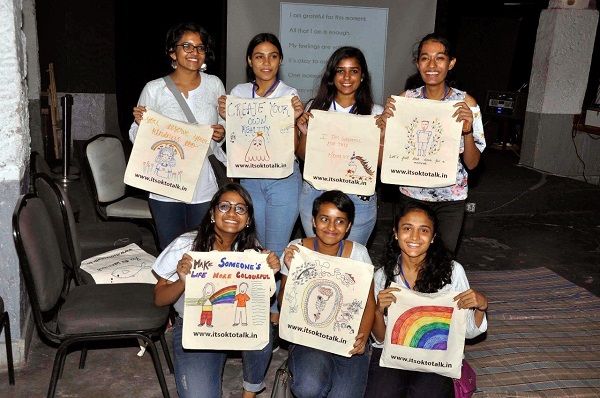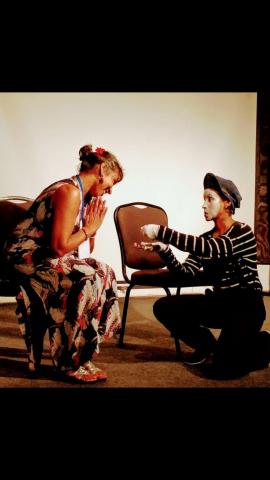
Delhi hosted a Mental Health Festival recently which was a convergence of ideas and therapeutic activities related to mental health issues. Moyna Sen takes a look at the 2-day interactive session.
Two Mental Health Initiatives, The Red Door, Pune, and Bhor Foundation, New Delhi put together an interesting mix of events for a Mental Health Festival titled Merchants of Madness in Hauz Khas, Delhi, on 1st and 2nd September. The festival aimed to start a conversation on mental health between participants who came from diverse backgrounds, and to initiate a mix of events to showcase the diversity of the exchange being addressed. The events ranged from movie viewing to panel discussions to dancing to mesmeric rhythms to creating art, poetry and theatre and above all to interactions with people who were gathered on a common platform. As Jhilmil Breckenridge, Founder – Bhor Foundation, puts it succinctly, “The purpose of this festival was to help people celebrate their lives, embrace the madness within and outside, and to accept all the shades of mind; because really, what is normal anyway? In addition to this overarching goal, we also wanted to equip people with the rich sharing of lived experiences which our generous panelists shared so easily and freely”.
‘’Merchants of Madness saw its inception in Pune and basically embodies the 7 years of groundwork The Red Door has experimented with,’’ says Reshma Valliappan (Val Resh), Artist, Writer, the Founder and the driving force of The Red Door and this festival. ‘’I was on the lookout for individuals who have not only used creativity in their own lives, but also have a strong voice to champion the cause, which is when Jhilmil and I started thinking along the same lines to make this festival a reality,’’ she explains.

Sharing experiences and thoughts always goes a long way in spreading any kind of awareness, and mental health is no exception. As Sonaksha Iyengar, illustrator, writer and artist, a mental health activist and also a panelist at the event says, “We certainly need to create more space to have conversations about mental health.” Talking about the Merchants of Madness event, she quipped, “I think most of the conversations that take place today is largely dominated by a prescriptive approach. But here it was refreshing to step away from that and focus more on just sharing personal narratives”.
In fact, sharing was at the core of the 2-day Festival. Val Resh puts it in perspective. Sharing for her is “connecting at the core”. “Sharing says, ‘I too have flaws, problems and dilemmas. Its life and its ok to talk about it,” says Reshma.
Day 1 marked a panel discussion on what is the trauma informed approach (with Eleanor Hodgson, Juhi Jha, Rachelle Bharati Chandran and Dhrubo Jyoti as participants), a film show on Schizophrenia, ‘Drop of Sunshine’, followed by a discussion between Val Resh and the filmmaker Aparna Sanyal, a mime show and lots of interactions.
Shrestha Das opened Day 2 with an extremely energising drumming session which also had people tap to the beats and step up the mood. A panel discussion on ‘Intersections of Creativity, Writing and Mental Health’ with Shreya Ila Anasuya (Editor: Skin Stories), Urvashi Bahuguna (poet), Sonaksha Iyengar and Chitra Kalyani (writer) threw open issues of how art and creativity can provide much needed comfort to a mind torn asunder. Compelling personal stories made the session a highlight of the festival. But how is art therapeutic? ‘’Art does not judge and allows room for mistakes. It gives us space to channelize the mind chatter,’’ says Val Resh. And Jhilmil agrees, ‘’ Art heals. Colours set you free.’’ The way the mind is engaged with creating anything, it is almost like a spa for the mind, she feels. For Sonaksha, taking refuge in art and colours has almost been an integral part of her journey. ‘’It became a daily activity to get away from the noise in my head,’’ she says.

A poetry writing workshop led by Urvashi Bahuguna sought to bring forth people’s inner thoughts. A movie screening ‘Come with Me’ featuring Jhilmil Breckenridge was particularly poignant and focussed on incarceration of women in mental institutions and its impact.
But did the festival set out to achieve what it aspired for? ‘’This festival brought so many people together, including medical professionals, corporate, teachers, other disability activists to ‘come out of the closet’ which isn’t always easy to do because it is invisible,’’ feels Val Resh. Jhilmil is delighted ‘’with the success, energy and magic of the event and can’t wait to start planning the next one’’.






